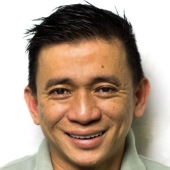
Establishing climate change resilient eucheumatoid cultivars: novel haplotypes, strain selection, breeding, and disease incidence and mitigation
Michael Y. Roleda, Professor, University of the Philippines, Philippines

Establishing climate change resilient eucheumatoid cultivars: novel haplotypes, strain selection, breeding, and disease incidence and mitigation
Michael Y. Roleda, Professor, University of the Philippines, Philippines
About the speaker:
Professor at The Marine Science Institute of the University of the Philippines–Diliman. Obtained his Dr. rer. nat. in Biology from the University of Bremen, Germany and undertook postdoctoral stints in Germany, Sweden, Scotland, New Zealand, and Norway. Returned to the Philippines in 2018 through the Department of Science and Technology (DOST) Balik Scientist Program. He has worked with tropical, cold temperate and Polar algae. Participated in land-based research expeditions in the Arctic and Antarctic. Research interests include carbon, nutrient, and stress physiology, reproductive biology, biodiversity, and applications and product development of commercially important seaweed species, among others. Currently working on selective breeding, biobanking, hatchery cultivation, and farming of the eucheumatoids– Kappaphycus and Eucheuma.
Presentation:
The talk will present initiatives related to current eucheumatoid research in the Philippines. These include exploring the unutilized reservoir of wild genotypes around the center of its biodiversity to develop new cultivars from the novel haplotypes found in natural populations. New cultivars are also developed from the progenies of wild fertile materials. From the established wild (parental) strains and F1 generation, their potentials as alternative cultivars were examined for crop improvement. Parameters measured include growth rate, carrageenan yield and quality, and susceptibility to epi-/endophytes infestation and diseases.
Interview:
1) When was the first time you got involved with seaweeds and why?
I first got myself with seaweeds in 1992 while working on my master's degree in Marine Science at The Marine Science Institute of the University of the Philippines Diliman. I was looking for a topic for my master's thesis and an opportunity to work on the ecophysiology and biochemistry of a commercially important red seaweed Gelidiella acerosa, an agarophyte, came up. Since then, for almost 30 years, I have worked with tropical, cold temperate, and polar seaweed species- working on different aspects of seaweed research from basic to applied sciences, especially on reproductive biology, culture, farming, strain selection, molecular diversity, application for food, feeds, and high value products in collaboration with cell and molecular biologists, animal scientists, and chemists, among others.
2) What is your view on the Asia-Pacific seaweed industry in 2030?
With increasing global human population, the requirement for seaweed biomass for different applications, e.g., food, feed, pharmaceuticals, cosmetics, and bioplastic, among others will also increase. The future expanding demand for seaweed biomass could potentially lead to competition among processors. In this regard, there is already a need to address concerns related to seaweed health and productivity and production of high quality biomass in the face of global climate change.
3) What will you be talking about at Seagriculture Asia-Pacific 2023?
Related to the concerns above, I will be talking about seaweed health and strain selection, specifically on the eucheumatoids, to improve crop productivity and quality to match the increasing demand for seaweed biomass for different industrial and commercial applications.